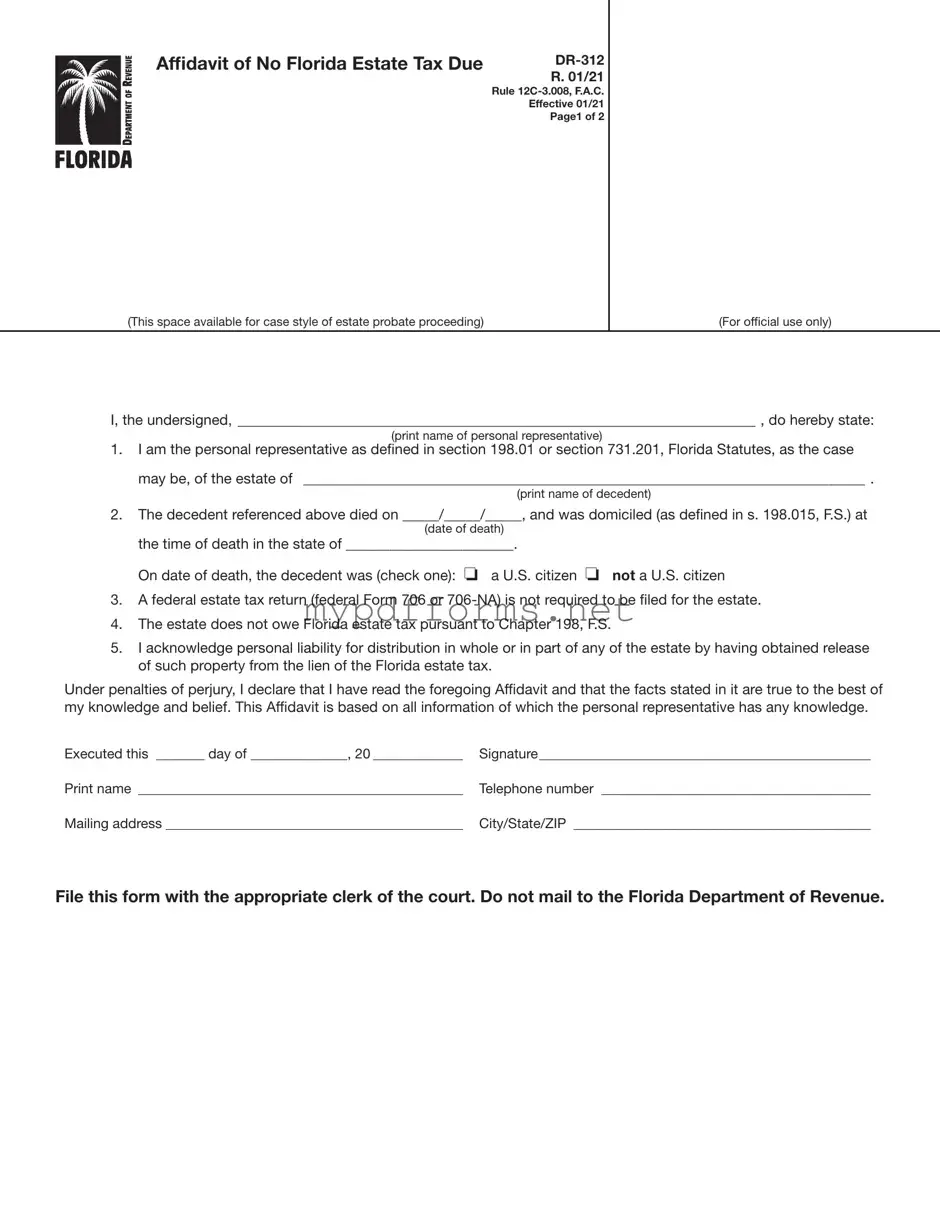The Affidavit of No Florida Estate Tax Due (Form DR-312) shares similarities with the IRS Form 706, the United States Estate (and Generation-Skipping Transfer) Tax Return. Both forms serve to clarify the tax obligations of an estate following a decedent's passing. While Form 706 is used when the estate exceeds certain value thresholds and requires federal estate tax filing, Form DR-312 is utilized when no federal estate tax return is necessary. The completion of either form involves the personal representative affirming the estate's tax status, underscoring the importance of accurate reporting in estate administration.
Another related document is the IRS Form 706-NA, which is specifically for non-resident aliens. This form is similar to Form DR-312 in that it addresses tax obligations following a decedent's death. However, while Form 706-NA is required for estates of non-resident aliens that meet specific criteria, Form DR-312 is designed for Florida estates that do not owe state tax. Both forms require the personal representative to assert the estate's tax status, but they cater to different circumstances based on the decedent's residency.
The Florida Department of Revenue's Nontaxable Certificate is also comparable to Form DR-312. This certificate historically served as proof that an estate was not subject to Florida estate tax. However, with the introduction of Form DR-312, the issuance of Nontaxable Certificates has been discontinued. Both documents aimed to provide assurance regarding tax liabilities, but the DR-312 has streamlined the process for estates that do not owe taxes, thus eliminating the need for a separate certificate.
The Affidavit of Heirship is another document that bears resemblance to Form DR-312. This affidavit is often used to establish the heirs of a decedent's estate when there is no will. Like Form DR-312, the Affidavit of Heirship requires a personal representative to affirm the validity of the claims made regarding the estate. Both documents serve important roles in the probate process, ensuring clarity and legal standing for the distribution of assets.
Additionally, the Florida Probate Court's Petition for Summary Administration is similar to Form DR-312 in that it addresses the administration of estates that may not require full probate proceedings. This petition is used for smaller estates, allowing for a quicker resolution. Both documents facilitate the process of settling an estate, but the Petition for Summary Administration is specifically for cases that meet certain criteria, whereas Form DR-312 is focused on tax liability.
The Certificate of Discharge from Personal Representative is another document that has parallels with Form DR-312. This certificate is issued when a personal representative has completed their duties and is released from further obligations. Both documents signify a conclusion in the estate administration process, with Form DR-312 confirming that no estate taxes are owed, while the Certificate of Discharge signifies that the personal representative has fulfilled their responsibilities.
The Affidavit of Small Estate is also comparable to Form DR-312. This affidavit allows for the simplified transfer of assets when an estate meets certain value limits. Similar to Form DR-312, it is used when the estate does not have complex tax obligations. Both documents aim to streamline the process of settling estates, providing a more efficient means of transferring property to heirs.
The Last Will and Testament itself can be viewed as related to Form DR-312, as it outlines the decedent's wishes regarding asset distribution. While the will does not directly address tax obligations, it sets the framework for how the estate will be managed and distributed. Both documents play critical roles in the probate process, with the will dictating the distribution and Form DR-312 confirming the tax status of the estate.
For individuals involved in motorcycle transactions, understanding the importance of the Georgia Motorcycle Bill of Sale is essential; it serves as a reliable proof of ownership transfer, covering essential details like the motorcycle's make and VIN. As part of this process, it is advisable to utilize resources such as the motorcyclebillofsale.com/free-georgia-motorcycle-bill-of-sale to ensure all documentation is complete and compliant with state regulations.
Lastly, the Petition for Letters of Administration is similar to Form DR-312 in that it initiates the probate process. This petition is filed to appoint a personal representative to manage the estate. Both documents are essential in ensuring that the estate is handled according to legal requirements, with the petition establishing the representative's authority and Form DR-312 addressing tax liabilities.

